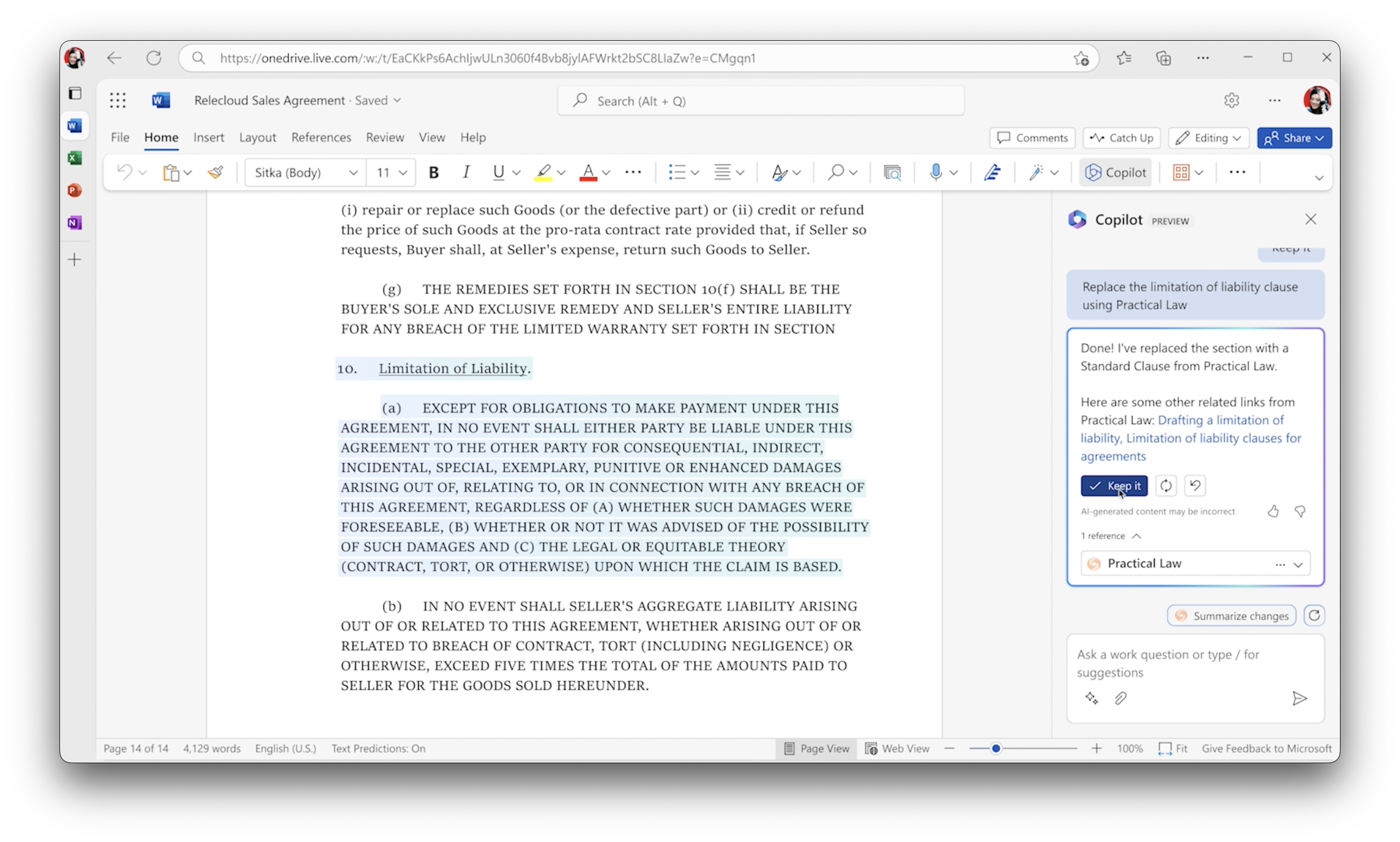Generative AI Insights from Emily Colbert: Sneak Peek of Practical Law

Emily Colbert, head of Product Management, Know How and Compliance, was among the presenters at the webinar Thomson Reuters hosted in June to offer sneak peeks of the generative AI capabilities in Westlaw, Practical Law, Legal Drafting tools, and the plugin with Microsoft 365 Copilot.
More than 150 attendees submitted questions during the webinar. Today, Colbert kicks off a multi-part series of Thomson Reuters leaders answering attendees’ questions. She shares how generative AI will enable Practical Law users to find relevant information more quickly and leverage Thomson Reuters drafting solutions.

Emily Colbert, Head of Product Management, Know How and Compliance
What’s the timeline for generative AI to be integrated into Practical Law?
Colbert: “We anticipate offering a beta version to a small group of customers in Q3 2023.”
Will Ask Practical Law be a part of Practical Law Dynamic Tool Set?
Colbert: “Yes. We integrated an AI-driven question-answering feature in Practical Law Dynamic Tool Set two years ago to leverage the expertise of our attorney editors to answer legal research questions. And Ask Practical Law builds on these efforts.”
For the “drafting indemnification provision for asset purchase agreement” use case, how is generative AI applied in that workflow? How is this different from your already great platform circa 2021?
Colbert: “You’re right – people already come to Practical Law to get quick answers to complex questions, to get up to speed on what’s new, and to find model language to get started drafting. With LLMs, we’re able to bring that to customers even faster with trusted answers from Practical Law. Right now, you can get this information in Practical Law, if you know what tool to go to and how to use it. And while the tools are easy to use, we know that some customers are coming into Practical Law only periodically and don’t always know what to do. With Ask Practical Law, users can simply ask a question and the model knows where to go and what resources and visualizations to pull in. The real value here is not just that you’re getting an answer to your question, it’s about bringing in the visualization and analysis that’s coming straight from our editors. What this conversational experience is allowing our customers to do is to get really quick access to our large team of attorney editors, to get trend information, to get how-to-do information, and to get that analysis right at their fingertips.”
How relevant will this be for non-US/UK jurisdictions and are there any plans in that regards for Practical Law?
Colbert: “Initially, our generative AI offerings will be available in the United States. We plan to introduce these tools in additional jurisdictions in the first half of 2024.”
Will Ask Practical Law be included in the current Practical Law offers, or will it be an add-on?
Colbert: “For existing Practical Law Dynamic customers, Ask Practical Law will be included. For customers that purchase Practical Law Dynamic after the launch of Ask Practical Law, there will likely be a commensurate increase in price.”
Is Practical Law mostly for lawyers with a transactional practice? Anything in Practical Law for litigators?
Colbert: “Practical Law covers most major practice areas, including procedural and substantive litigation topics.”
Sometimes I will want to generate multiple documents based on a Practical Law precedent or inhouse precedent, i.e. multiple versions of board minutes for various group entities. Will the drafting and generative AI application allow me to prepare multiple versions by using mail-merge style tools as part of the AI drafting process?
Colbert: “Practical Law currently offers a “resolution generator” using traditional document automation technology. As we build out our generative drafting and transaction management capabilities, we will continually evaluate the technology that is best suited to the task and integrate those capabilities into our Microsoft Word experience.”
Will there still be traditional Boolean searching capabilities in Practical Law?
Colbert: “Our most common searches today are simple one- or two-word key word searches rather than complex Boolean searching. However, we are not taking away any of our current search capabilities. Users will have the option to search via conversational or more traditional search methodologies.”
For more insights from Colbert and other Thomson Reuters leaders on shaping the future of work in the legal profession with generative AI, register here to access the recording of the June webinar. Also, sign up on TR.com/AI for updates on how Thomson Reuters is integrating generative AI across its legal solutions.